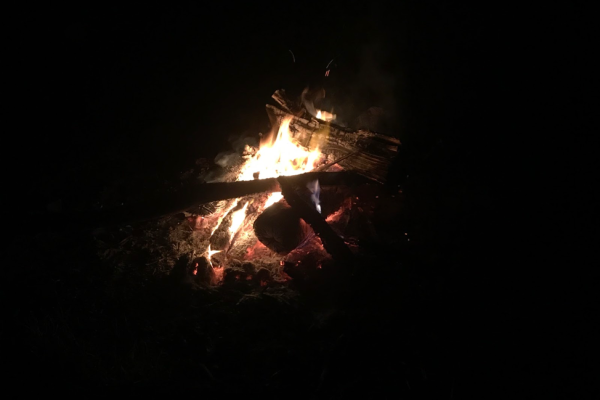Core Work 9.24.19: Ancient Lineage and New Spaces

Report by Emily Hartford.
WHO: Corey Allen, Emily Hartford, Rachael Hip-Flores (video chat), Elizaveta Kravnchenko, Morgan McGuire, Dominique Rider, Corinna Shulenburg (video chat), Alisha Spielmann, Isaiah Tanenbaum, Stephanie Willing (video chat). And, while Jason Tseng wasn’t able to attend, we were thrilled to read new pages from them—from the play whose ending emerged like a tsunami late night at Little Pond! It was super exciting to have a new-to-Flux person, Elizaveta (Liza) in our midst—joining us, in particular, to read a key role in Dominique’s new play.
WHAT: An expansive conversation about theatre norms in our technological age, introduced by Corey Allen; The Other Side by Jason Tseng; + by Dominique Rider; Eshet Chayil by Morgan McGuire.
FAVORITE MOMENTS / THE THINGS WE WANT TO REMEMBER (by the folks who were present at closeout):
- ALISHA: How distinctly different each piece of the night was—from the conversation to the three plays—all extremely strong and so of the voices they came from
- ISAIAH: The chance to share a scene with Rachael again
- DOMINIQUE: Play notes from Morgan
- CORINNA: Really grateful to be a mother at home with her kid who could still play—that was meaningful to me and we also got to have Stephanie participating in that way
- LIZA: I love getting to be in a space working on new projects, so thank you for having me
- MORGAN: I like to watch Dominique be sweet
- EMILY: I love that Corey embraced the openness of this new form, and brought us an invitation to that conversation
- EMILY: I’m so excited that Dominique brought us a brand-new-to-us person in Liza
- RACHAEL: The chance to be involved in everyone’s big questions and the art exploring those big questions
- DOMINIQUE: Hearing Morgan’s words out loud for the first time!
- CORINNA: It was really exciting to read Brick (in Dominique’s play)—as a recently-socially-transitioned trans woman, playing power and strength can feel complicated and sometimes corrosive—but to get to play this badass half elf ranger is very exciting.
MORE DETAILS, PLEASE
This was our second NYC Core Work session, and the first one that I hosted (in fact, the first one that I’ve attended, since I was out of town for the first!) Corinna and I have been in active-wrangling mode in these first few sessions, to make sure we start this new program with some momentum—and wow, did our friends respond to that wrangling with their vibrant art and glorious presences!
We started with a section led by Corey. Corey brought in a conversation, inspired by thoughts he’s been having since he saw Slave Play on Broadway—and also witnessed the Twitterstorm regarding Rihanna’s in-performance texting with playwright Harris. Corey invited us to grapple with theatre, and social media, and phones in our current moment. It was an expansive conversation, with so much explored: How do we carry forward what feels like a sacred and ancient lineage—how do we connect to the magic of the low-tech, in-person magic of theatre? When does a viral moment overshadow the work? How do we reckon with the way “theatre etiquette” is so often used as a tool for racialized and gendered oppression? How can we transform our theatre spaces through technology? How do we grapple with our relationship to technology, when we all have been made addicts? How can we create work so vibrant that each space we make can be new—and can invite its own joyfully unique norms for engagement?
We then read the first few scenes of Jason Tseng’s new play, The Other Side, which goes deep with two characters into an exploration of accountability for sexual violence. Jason wasn’t able to attend, so we recorded Isaiah and Rachael reading the roles, and the group’s responses to playwright questions afterward. Most of us have only witnessed the beginning of this play (Rachael had the privilege of reading the fresh-baked pages with Jason one night at Little Pond!)—but in just this brief beginning, we jump in to wrestle with what justice looks like, for a rape survivor—and whether revenge could be rightly part of that recipe.
Next, we read the opening scenes of Dominique’s play, +, which asks if we know what we mean, when we say, “this is a space for women+” The action centers around a D&D group composed of white non-binary people and women (read by Liza, Alisha, Corinna, Stephanie, and Emily)—and the way the people in that space respond to a Black non-binary person (+, read by Dominique) who joins their game. A portrait on the wall of Marsha P. Johnson (described/portrayed by Morgan McGuire in her stage direction reading) is +’s sole lifeline in a sea of microaggressions. In tension with the, well, tension, is the thrilling and epic world of the D&D campaign that the play enters theatrically and adventurously into.
With mere minutes to spare, we had the privilege of jumping in to pages from Morgan’s play, Eshet Chayil. We transitioned from the epic back to the pressure cooker of a two-hander—with Alisha and me reading a pair of best friends, stranded together during a hurricane…while one of the women confronts the imminent end of her pregnancy, with a child she knows will survive no more than a few hours. It was foreboding and also so fun—the pleasure of sitting in the depth of that friendship, with the apprehension of all that was looming.
And then, we did our collective note-taking and we called it a night. And maybe in the new space we made together, we carried a little bit of that ancient fire.




Recent Comments